IndieWire’s Chief Film Critic Eric Kohn Picks the Best Movies of 2020 — Year in Review

- Oops!Something went wrong.Please try again later.
Every year, the movies face an existential crisis and bounce back, but 2020 doesn’t look like every year. The pandemic’s dramatic impact on nearly every facet of human life has caused unprecedented damage to cultural institutions and the work they present. In America, most movie theaters remain closed, film festivals have gone virtual, and film productions have become dicey mess of insurance and safety challenges that only the savviest producers can sort out. Yet despite these dire challenges and the uncertainty of the future, the cinema remained very much alive throughout the year, with a wide range of ambitious undertakings snaking their way into whatever form of release seemed viable.
Despite the impossible odds, this has been one of the richest years in recent memory for a wide range of movies to trickle through an uncertainty marketplace that would have been hostile to them even in pre-pandemic times. The blockbusters receded to the background, and as it turns out, film culture didn’t really need them. It has been heartening to see that some fundamental truths don’t change: As usual, anyone who thinks this was a bad year for movies simply didn’t see enough of them.
More from IndieWire
Qualification rules have been bent many times this year, but this annual list of the best movies of the year didn’t have to change its tune. Everything that made the cut either received a theatrical run somewhere in the United States, will hit theaters before the end of the year, or received a VOD release. That means readers keen on filling in some blindspots should have no trouble catching up.
Most of the best movies of 2020 weren’t made this year, but sure do speak to it. From election anxieties to the eerie psychological effects of social distancing, 2020 was a mood like no other, and many of these movies have become retroactive embodiments of those unusual feelings. That’s not exactly a happy accident: The world was already a haunting and mysterious place that modern storytellers were attempting to parse, so when the mood intensified, their movies arrived right on schedule. At the same time, many of the year’s cinematic highlights offer some measure of hope for the future, or at least celebrate the prospects of embracing the unknown.
Each year, this list gets a bit longer, but it never feels long enough. Last year’s 19 best movies of 2019 left me clamoring for one last slot. If I had a few more this time around, they’d likely make room for these runners-up: “Another Round,” “Gunda,” “I Carry You with Me,” “I’m Thinking of Ending Things,” “Minari,” “Relic,” “Truffle Hunters,” and “The Painter and the Thief.”
See them all! But go with these first.
20. “She Dies Tomorrow”

Neon
Amy Seimetz’s long-awaited follow-up to “Sun Don’t Shine” was the crystal ball that predicted the queasy mood of the year to come. The writer-director’s eerie and enigmatic dark comedy imagines a psychological virus, gradually spreading through Los Angeles that makes the afflicted believe they’ll suffer the titular fate. These days, who can’t relate? With a dazed Kate Lynn Sheil performance at its center, “She Dies Tomorrow” evolves into a remarkable allegory for existential anxiety and its infectious potential. By turns soulful, disturbing, and sad, the movie uses its many unsettled faces to show how a single unnerving emotion can unite us all.
19. “Dick Johnson Is Dead”
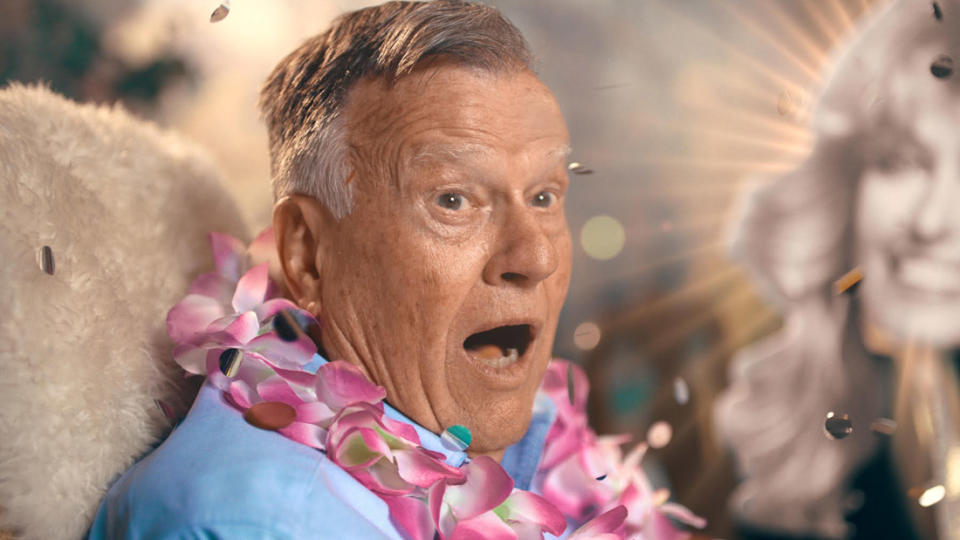
Netflix
Dick Johnson dies many times in his daughter Kirsten’s poignant and personal documentary, starting with the opening credits. But of course he’s alive the whole time, playacting through an elaborate form of cinematic therapy with his filmmaker offspring as she wrestles with the anxiety of losing him. That concept could easily devolve into a navel-gazing exercise, but Kirsten Johnson (the veteran nonfiction cinematographer who directed 2016’s wondrous collage film “Cameraperson”) enacts a touching and funny meditation on embracing life and fearing death at the same time. Oscillating from intimate father-daughter exchanges to surreal meta-fictional tangents, the movie lives within its riveting paradox, reflecting the queasy uncertainty surrounding its subject’s fate — and, by extension, everyone’s. Alternately hilarious, moving, and revelatory, “Dick Johnson Is Dead” manages to commune with a universal fear of death by transforming it into a celebration of life.
18. “The Vast of Night”
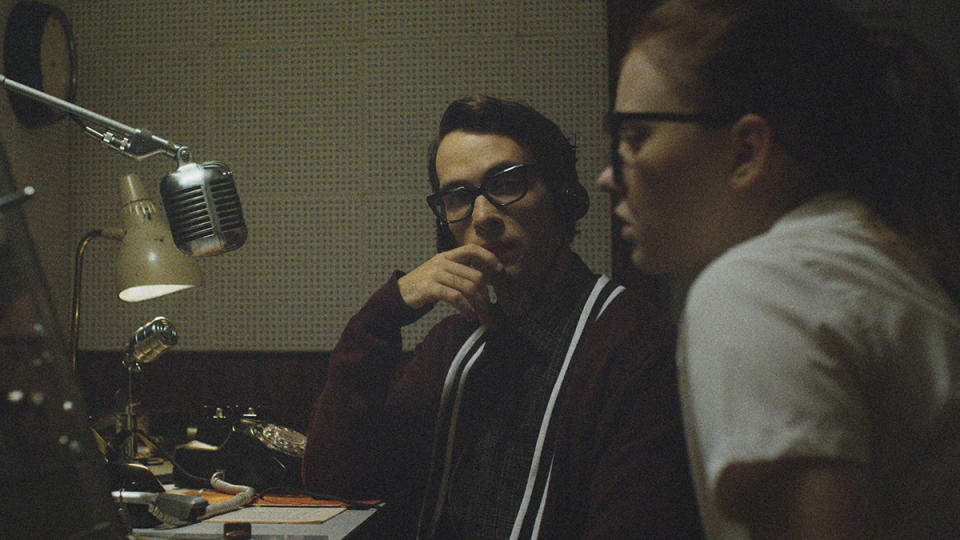
Amazon Studios
“Close Encounters” by way of Robert Altman on a shoestring, “The Vast of Night” is one of the more positive surprises 2020 had to offer: an audacious debut that takes familiar material and spins it into an unpredictable package. Director Andrew Patterson’s first feature unfolds as if its characters were trapped within the confines of an anthology series of the “Twilight Zone” vintage, but it digs much deeper than that. Set against the vivid backdrop of 1950s-era small-town New Mexico, the movie finds an overconfident young radio deejay (Jake Horowitz) and an eager switchboard operator (Sierra McCormick) darting around town to the determine the source of a mysterious signal that seems to be coming from the stars. Could it be something truly out of this world?
Well, most viewers know the drill on that question. But the cadences of Patterson’s whiz-bang direction, from an audacious long take that zips from the radio station across a field and through a damn basketball game all the way down to the awe-inspiring mystery of its final moments, when a pair of characters consumed by the potential of new technologies confront something beyond belief. It will leave you grasping for answers — and ready to embrace whatever Patterson does next.
17. “Mangrove”
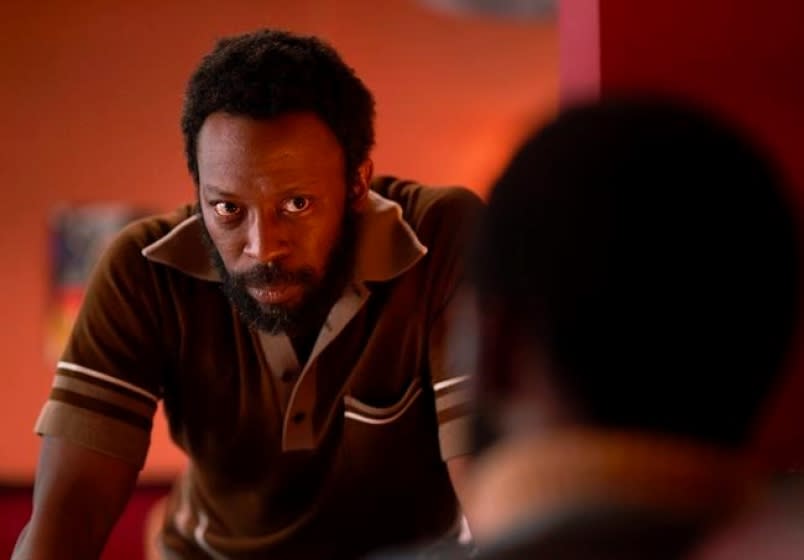
Des Willie/Amazon Prime Video
The dramatic story of the Mangrove Nine, when a group of Black British activists fought back against racist police raids in a tense series of courtroom showdowns, practically pitched itself as a movie when it unfolded in 1970. (They were acquitted of most charges, but the raids didn’t stop.) It only took 50 years, but writer-director Steve McQueen’s “Mangrove” works overtime to fill the gap, resulting in a delectable crowdpleaser both specific to its moment and relevant today.
Produced as part of the filmmaker’s ambitious five-film “Small Axe” anthology about Black British Londoners across several decades, “Mangrove” is a taut and thrilling judicial drama that transcends the genre while working within its barriers. The movie delves into the usual assemblage of passionate monologues about equal rights and dedication to the cause. But it’s also grounded in a detailed ecosystem so rich with the sentiments of the moment that it eventually makes an old routine feel new, with a gripping Shaun Parkes as the morally conflicted restaurant owner as its centerpiece, McQueen again proves he’s one of the best actor’s directors working today.
16. “Mayor”

YouTube/screenshot
David Osit’s thrilling and perceptive documentary provides a remarkable snapshot of the Israeli-Palestinian conflict from the inside. Ramallah is only 10 miles north of Jerusalem, but for Palestinians living under occupation, the distance feels much longer. Osit trains his camera on Musa Hadid, the overworked protagonist at the center of an operatic vérité drama that often dips into bureaucratic black comedy and unnerving suspense, as Hadid’s exasperated attempts to keep the peace dissolve into a constant swirl of frustration. The movie doesn’t exactly dwell on the hardships of Hadid’s job so much as it gets inside his headspace to illuminate the vanity of the world around him. It’s gripping, sad, and essential viewing for anyone looking to understand the nature of this ongoing crisis and why it keeps moving in the wrong direction.
15. “Mank”
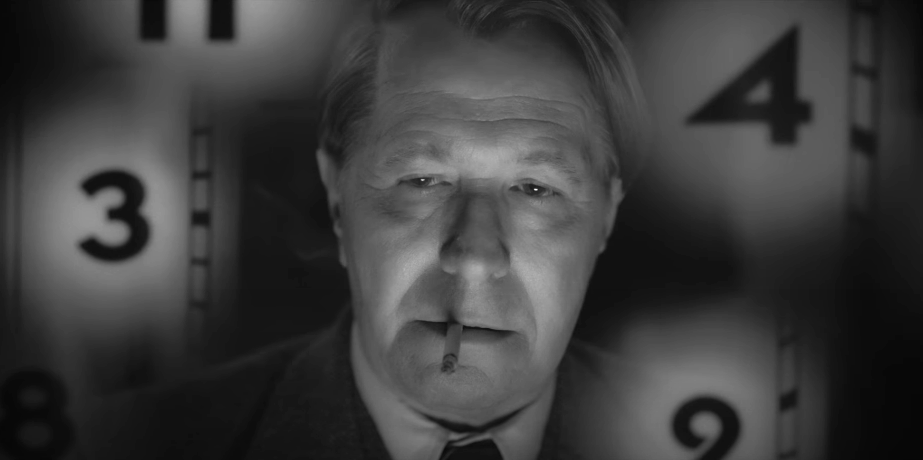
Netflix
There have been countless movies about the Golden Age of Hollywood that celebrate its grandeur or bemoan the harsh business tactics of cigar-chomping leaders. But David Fincher doesn’t have to worry about precedents. With “Mank,” the filmmaker transform his late father Jack’s screenplay into a rich, haunting meditation on the restless career of “Citizen Kane” screenwriter Herman J. Mankiewicz (a frantic Gary Oldman at his best), working around the mystique of the proverbial “greatest movie of all time” to create a more alluring window into the world that inspired that work — namely, powerful men whose influence extended far beyond the arena of entertainment and changed the fabric of society as a whole. Zipping between the 1934 gubernatorial race and bedridden Mank’s attempts to piece together his magnum opus, “Mank” uses its meticulous black-and-white scenery and complex soundscape to resurrect its era while commenting on how it reverberates to this day. Countless movies about Hollywood go behind the scenes; “Mank” is one of the few tells us what they really mean.
14. “Soul”
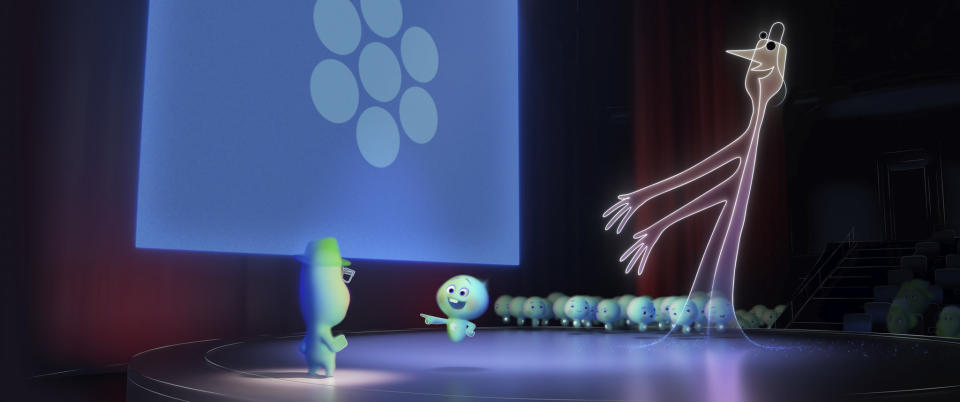
Disney/Pixar
Over the decades, Pixar’s track record with original stories has been so good that it can be tricky to wade through the hype to recognize a true masterwork. Yet Pete Docter’s winning look at a jazz musician (Jamie Foxx) attempting to escape the afterlife for the sake of a last-second gig is just that: The Pixar touch and then some, “Soul” uses its magical context to deliver a surprisingly intimate look at one man’s quest for purpose in life, and how it impacts the ambivalence of a unborn mind (Tina Fey) who thinks she can escape its clutches forever. Sure, the imagery includes a dizzying blend of psychedelic afterlife visions and crisp New York scenery, it has some of the best animated musical performances ever, and the climactic chase unfolds under such innovative circumstances that they defy any one-line summation. But the essence of “Soul” rests with the profound nature of its character’s journey, a universal quest toward self-discovery that turns on the prospects of second chances. It’s a tearjerker with cosmic purpose.
13. “Sound of Metal”
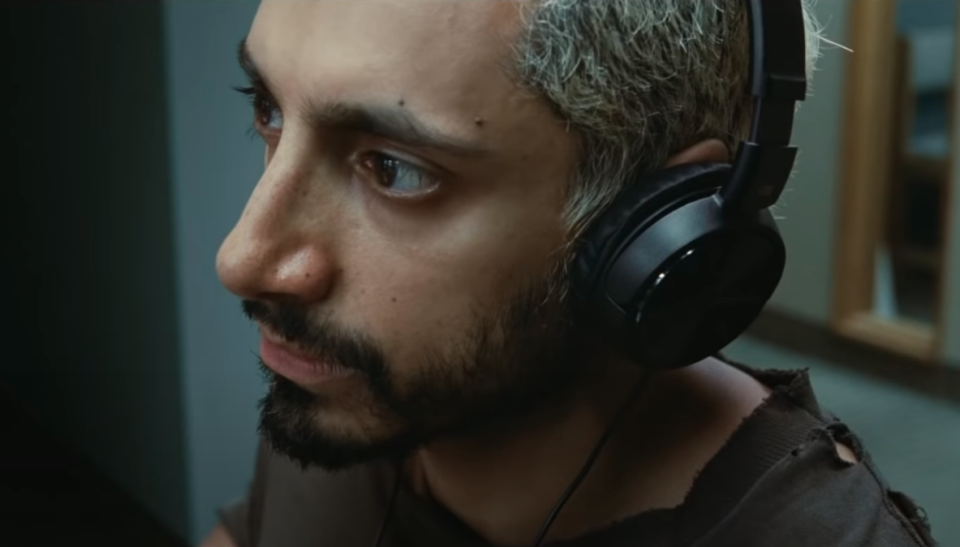
Amazon
Riz Ahmed is the sort of frantic screen actor who always looks like he might jut out of the frame, and in “Sound of Metal,” he’s trapped. As Ruben, the heavy-metal drummer going deaf at the center of the mesmerizing debut from writer-director Darius Marder, Ahmed conveys the complex frustrations of losing touch with the world around him no matter how much he fights to hold onto it. This devastating conundrum relies on the best use of sound design in recent memory, as Marder immerses viewers within the confines of Ruben’s deteriorating relationship to the world around him, and he sorts through the wreckage to construct a new one. Ahmed’s brilliant performance turns on a complex soundscape that resonates even in total silence.
12. “The Assistant”
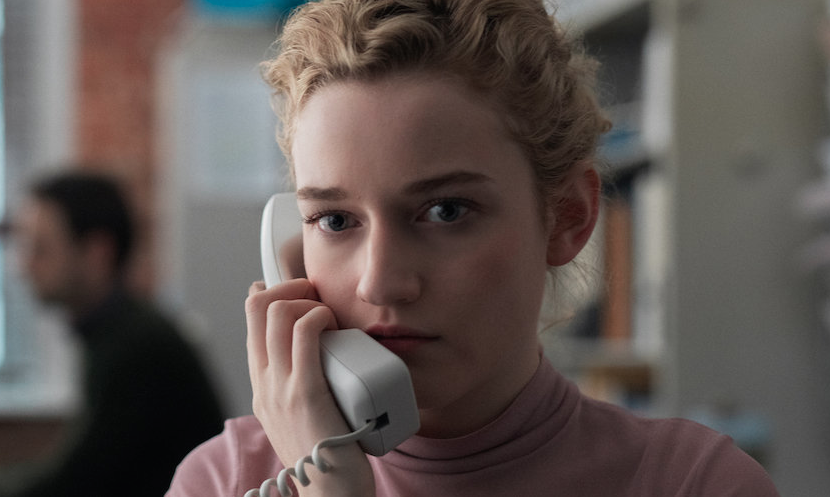
Bleecker
Harvey Weinstein doesn’t appear in “The Assistant,” and nobody mentions him by name, but make no mistake: Director Kitty Green’s urgent real-time thriller marks the first narrative depiction of life under his menacing grip. “Ozark” breakout Julia Garner is a revelation as the fragile young woman tasked with juggling the minutiae of the executive’s life, arranging a never-ending stream of airplane trips, staving off angry callers, and picking up the trash left in his wake. Beyond a few unfocused glimpses of a hulking figure roaming his office in the background, the Weinstein of “The Assistant” is a phantom menace who barrels down on the young woman’s life, but this fascinating psychological investigation doesn’t allow him to hijack a story that belongs to her. Amid galvanizing stories about what it took to speak out, “The Assistant” is an essential reminder of why it took so long for the world to hear about it.
11. “Bloody Nose, Empty Pockets”
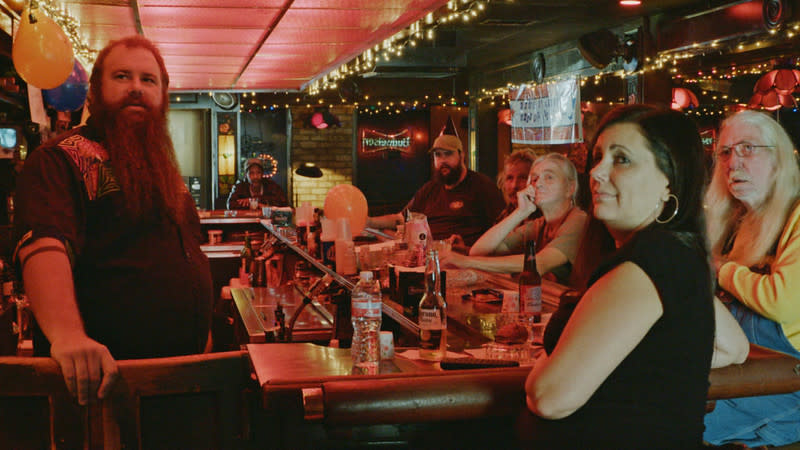
At first glance, “Bloody Nose, Empty Pockets” unfolds as a brilliant work of cinema verite. Bill and Turner Ross’ boozy hangout movie captures the last raucous night at the Roaring Twenties, a grimy bar on the outskirts of the Vegas strip where various inebriated outcasts bury their sorrows in a blur of anger and poetic laments. It’s late 2016, and with the presidential election about to change the world, the pub serves as a fascinating microcosm of America’s fractured, browbeaten underbelly on the verge of self-destruction. But here’s the thing. The Roaring Twenties is in New Orleans, not Vegas, and the characters populating its interior didn’t just wander in. Though nothing in the movie acknowledges as much, the Ross brothers cast people to populate the bar, recording the drunken antics of their chosen performers throughout an actual debaucherous night. The result is both a grand cinematic deception and a bold filmmaking experiment. “Bloody Nose” was a wonderful cinematic provocation at the start of the year, but at its end, this blurry narrative of a business closing its doors after one last shindig has a whole new layer of bittersweet connotations.
10. “Bacurau”
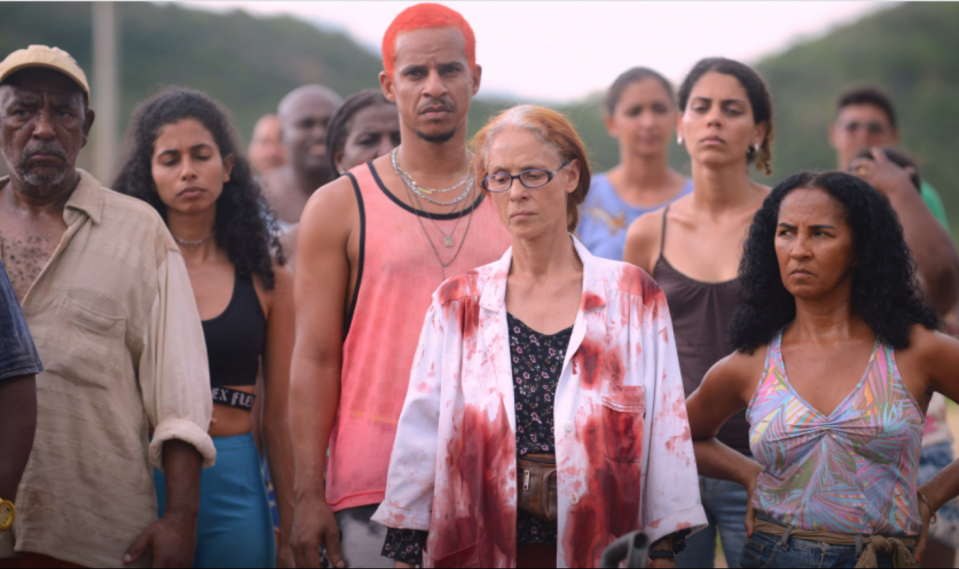
Kleber Mendonca Filho and Juliano Dornelles’ futuristic Brazilian Western, which finds a remote town banding together against mysterious vigilantes, takes on a profound symbolic quality as the movie builds to its bloody finale. The movie turns on a remote desert society defined by its self-sustaining ethos and forced to fight to sustain its existence against the murderous bureaucracy closing in. And so they do: Even a wild-eyed Udo Kier as the movie’s deranged supervillain can’t stop Sonia Braga with blood in her eyes, or the vengeful ghosts of a world not yet ready to give up its battleground. Filho and Dornelles channel the best of John Carpenter and Sergio Leone even as they push the material into a more enticing and unpredictable surrealist plane, where the specter of colonialism looms large but so does the resistance.
While the movie certainly has precise national ramifications for Brazil’s current struggles with democracy and class warfare, those issues resonate on a global scale more than ever before. “Bacurau” explores them with relentless intrigue and boundless rage. Juggling B-movie escapism and high art, the movie ultimately celebrates the idea of self-preservation as a communal struggle. That’s a lesson we can’t learn enough, and in “Bacurau,” it arrives with explosive force.
9. “Borat Subsequent Moviefilm”
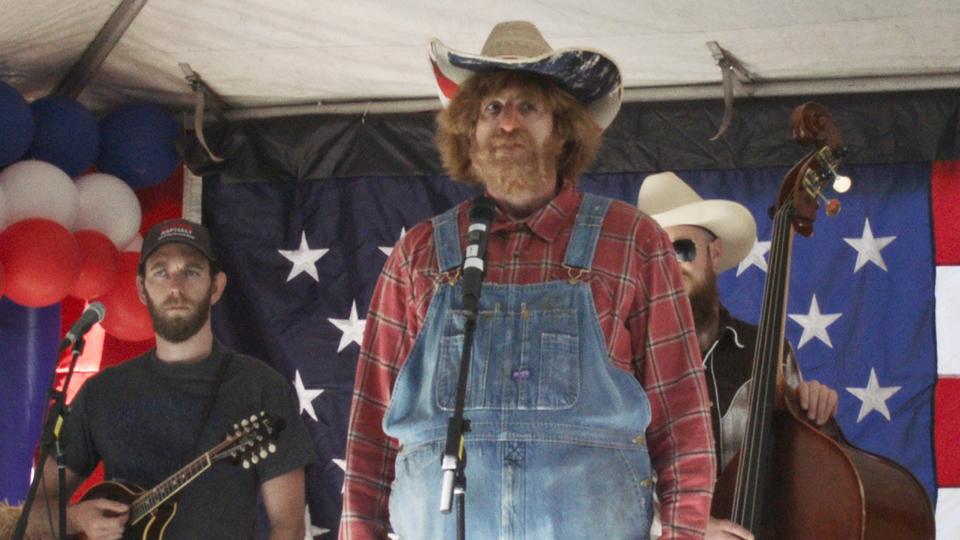
©Amazon/Courtesy Everett Collection
In recent years, American satire has been in crisis. How does one possibly lampoon a society that already makes fun of itself? Leave it to Sacha Baron Cohen to figure that one out. The comic performer made a surprise return to his most famous character 14 years after the fake Kazakh journalist made his way across America to expose its ugliest extremes. As the country got uglier, it was clamoring for another trenchant exposé, which Baron Cohen and his team of writers have unearthed with another scathing blend of activism and absurdist performance art. Cranked out in secret during the pandemic, it’s one of the few 2020 releases to actually capture the lunacy of the year with genuine payoff.
The cringe comedy quotient is high this time around, as Borat and his daughter Tutar (Maria Bakalova, the year’s best onscreen discovery) make an ill-conceived attempt to deliver the woman to Mike Pence — and eventually Rudy Giuliani, in a remarkable “gotcha” moment for the ages that assailed whatever shred of credibility he had left. Hidden cameras work wonders, but they’re nothing without the talent in front of them. Baron Cohen’s ability to expose the lunacy of modern times has only grown more purposeful with time, even when it’s silly as all hell. These crazy times demand no less.
8. “The Mole Agent”
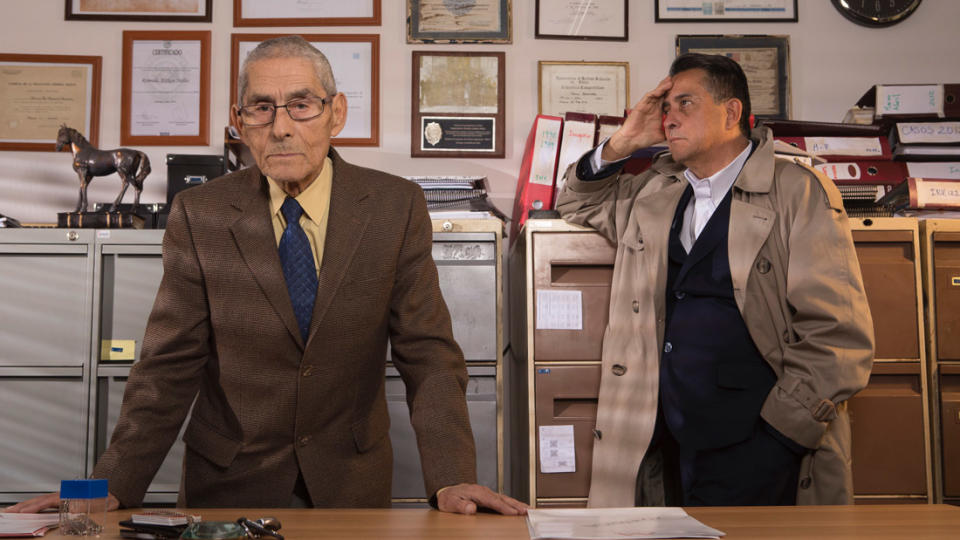
Gravitas Ventures
There’s a certain immersive thrill that comes from documentaries that hide themselves, and “The Mole Agent” epitomizes that appeal. Chilean director Maite Alberdi’s delightful character study unfolds as an intricate spy thriller, with a sweet-natured 83-year-old widower infiltrating a nursing home at the behest of a private detective. The plan goes awry with all kinds of comical and touching results, so well-assembled within a framework of fictional tropes that it begs for an American remake. But as much as such a product might appeal to companies hungry for content, it would be redundant from the outset, because “The Mole Agent” is already one of the most heartwarming spy movies of all time — a rare combination of genres that only works so well because it sneaks up on you.
7. “The Climb”
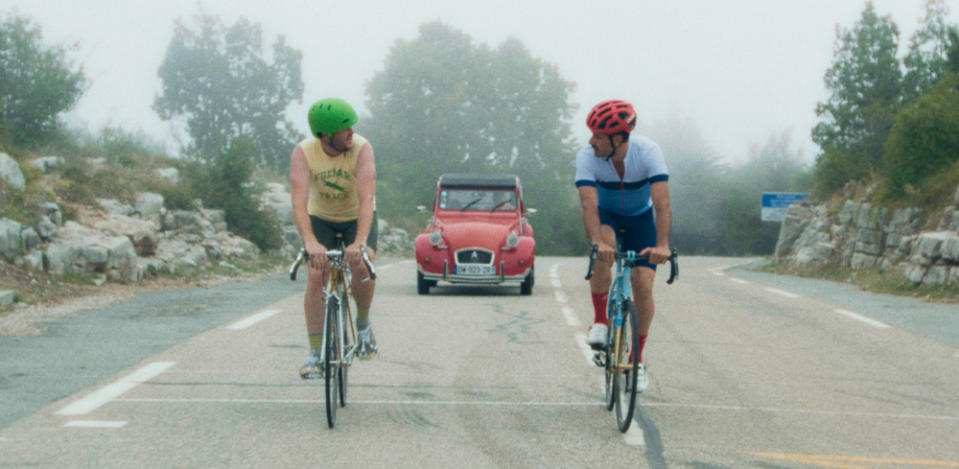
SPC
The premise of “The Climb” has been told so many times it’s a small miracle that this one works at all: Two lifelong buddies test the boundaries of their friendship when a woman comes between them. Yet Michael Covino’s absorbing directorial debut confronts that challenge with stunning cinematic ambition, resulting in a brilliant reinvention of the buddy comedy. Testosterone-fueled dude movies have occupied every facet of the filmmaking landscape in recent years, from the Duplass brothers to “Step Brothers,” but “The Climb” transforms that trope into a fresh vision of boozy showdowns and awkward laments, resulting in a winning tragicomic vision of its own design.
The starting point for “The Climb” goes back to a 2017 Sundance short film, with a clever scenario so economical it never could have hinted at the grand design to follow: Longtime pals Mike (Covino) and Kyle (co-writer Kyle Marvin) bike up a steep hill as Mike, the fitter of the two, speeds ahead, while confessing that he’s been sleeping with Kyle’s fiancé. In seven tight minutes, the short envisioned a pair of dopey, breathless man-children whose tight bond is tested under the silliest of circumstances. Where could it possibly go from there? As it turns out: Many exciting places, as this sharp two-hander veers from caustic to sweet with acrobatic filmmaking to spare. If American comedies held this much innovation in every scene, every formula would feel like a fresh discovery. Until that utopian moment, at least we have “The Climb.”
6. “Time”
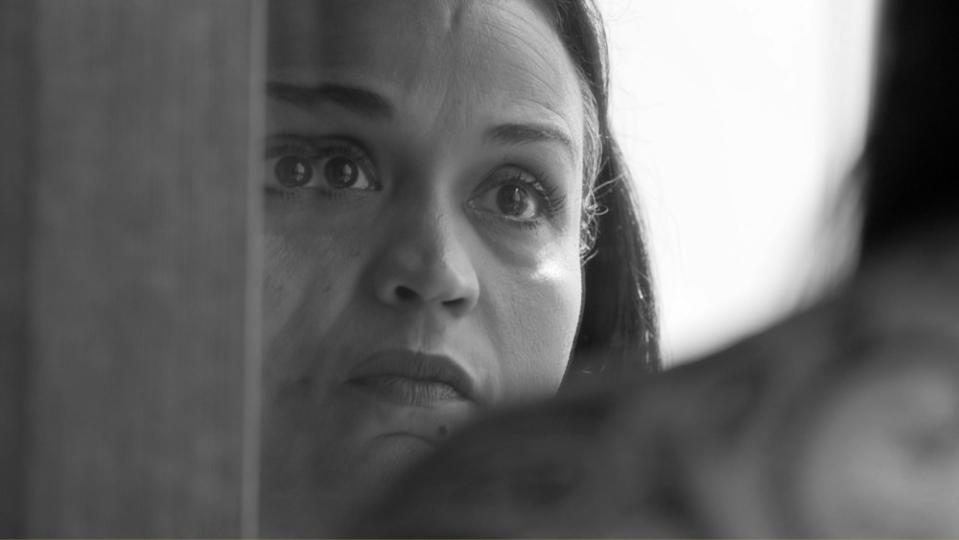
Amazon Studios
It takes a matter of seconds for “Time” to become something special: a stirring piano score surveys years of resilience in a Black family, director Garrett Bradley’s radiant first feature merges form with function to brilliant effect. The movie unfolds as an operatic black-and-white elegy stretched across the decades, merging the intimacy of its design with a stirring sense of purpose. The plight of Sibyl Fox Richardson, a determined mother of six battling her husband’s 60-year prison sentence, avoids every obvious opportunity to take the conventional route. There are no talking heads or explanatory titles cards; instead, the elegance of each poetic exchange underscores the emotional weight of Fox’s struggle, and the clarity she has found in rebuilding her life. By the time she chants a familiar mantra in the closing minutes — “Success is the best revenge!” — the movie reinvented the concept form the ground up.
Rather than digging into the pileup of legal hurdles involved in navigating her husband’s early release, Bradley trusts each lyrical image to convey the stakes at hand. “Time” encompasses a wide canvas, from institutionalized racism to Black excellence as a profound state of mind, and every face deepens the nature of its drama. It’s a riveting sociological exploration in pure cinematic terms, and one of a few 2020 highlights that challenge documentary filmmaking to think big, even when it comes to small stories.
5. “Never Rarely Sometimes Always”
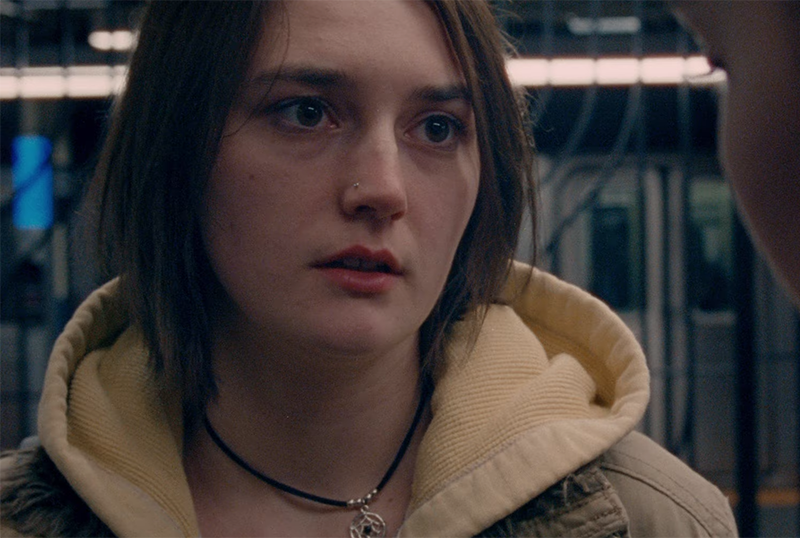
Focus Features
In lesser hands, “Never Rarely Sometimes Always” might be the earnest story of a teenage girl looking for an abortion, and not the wrenching, high-stakes survival story that Eliza Hittman has made. Fulfilling the potential of “It Felt Like Love” and “Beach Rats,” the director’s third feature blends the social-realist intensity of a Dardenne brothers movie with the fragility of its young protagonist’s journey to create one of the most thrilling coming-of-age stories in recent memory.
At its center, breakout star Sidney Flanigan pulsates with the frantic uncertainty of a young woman attempting to escape the inevitable hardships that await her at every turn. Sneaking off to New York from Pennsylvania in the hopes that her parents won’t know, the character wrestles with the looming terror of her endgame even as she remains committed to seeing it through. It’s an exhausting ride to follow her on that journey and its many Kafkaesque turns, but the centerpiece of the movie comes down a single tearful admission that transcends the specifics of the plot to become a devastating plea for empathy. And wow, does it sting.
4. “Nomadland”
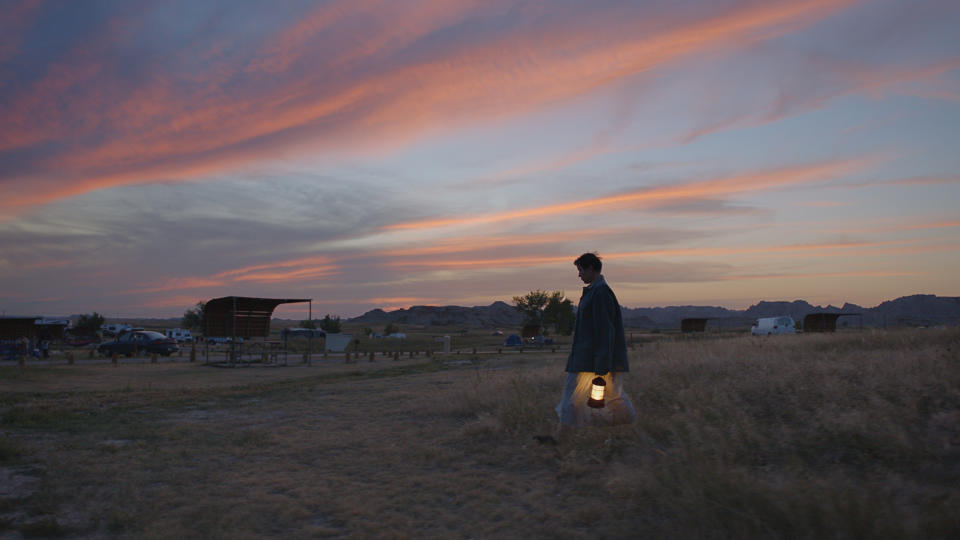
Courtesy of SEARCHLIGHT PICTURES
“Nomadland” is the kind of movie that could go very wrong. With Frances McDormand as its star alongside a cast real-life nomads, in lesser hands it might look like cheap wish fulfillment or showboating at its most gratuitous. Instead, director Chloé Zhao works magic with McDormand’s face and the real world around it, delivering a profound rumination on the impulse to leave society in the dust. Zhao previously directed “The Rider” and “Songs My Brother Taught Me,” dramas that dove into marginalized experiences with indigenous non-actors in South Dakota. “Nomadland” imports that fixation with sweeping natural scenery to a much larger tapestry and a different side of American life.
Inspired by Jessica Bruder’s non-fiction book “Nomadland: Surviving America in the 21st Century,” the movie follows McDormand as Fern, a soft-spoken widow in her early 60s who hits the road in her van, and just keeps moving. The movie hovers with her, at times so enmeshed in her travels that it practically becomes a documentary. Instead, the movie develops an entrancing narrative about American alienation and the appeal of escaping society’s oppressive clutches. Zhao embraces the paradox at the center of a story that both celebrates its character’s liberation and bemoans that sad state of affairs that put her on that track. As America contends with its divided identity, “Nomadland” both captures the zeitgeist and embraces the fantasy of leaving it all behind for life on the road.
3. “Collective”
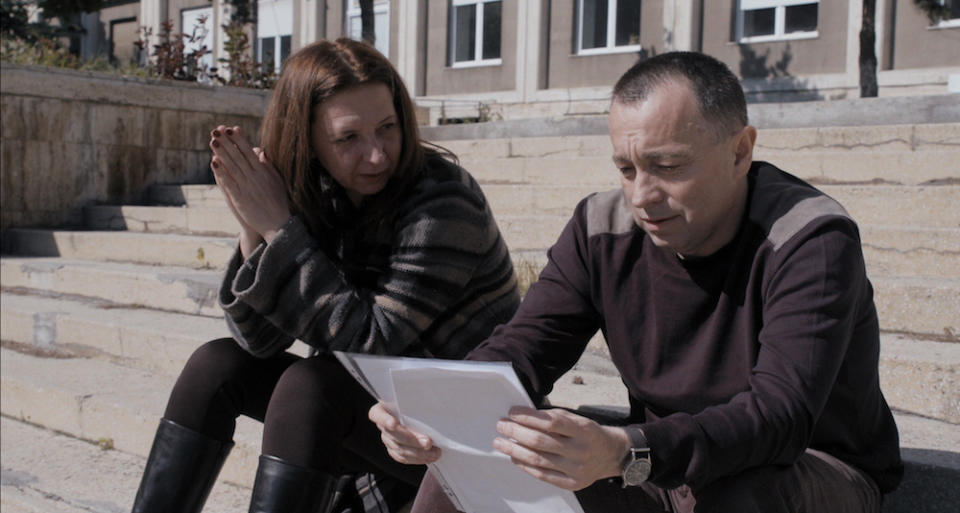
HBO
“Collective” starts as one of the greatest journalism movies of all times, and then it goes one step further, exposing democracy at war with itself. Romanian director Alexander Nanau’s bracing, relentless documentary tracks the aftermath of the 2015 fire that killed 64 people, hovering at the center of a system on the verge of collapse. And then it does, much like the flames that engulfed Bucharest’s Colectiv nightclub and sent the nation into a tailspin. “Collective” plays like a gripping real-time thriller, merging the reportorial intensity of “Spotlight” with the paranoid uncertainty of “The Manchurian Candidate” as it explores the national fallout of a tragedy that won’t let up.
Its initial hero emerges from an unlikely place: Sports Gazette reporter Catalin Tolontan and colleague Mirela Nega run the phones with an aggressive work ethic that would leave Woodward and Bernstein in awe, but it’s not just their story; Nanau makes the bold decision later on to switch focus to new minister of health Vlad Voiculescu, who’s tasked with leading a transparent overhaul of Romania’s dysfunctional medical system, even as he faces pushback at every turn. Juggling this dense assemblage of strategy sessions under the looming cloud of a national election, the movie provides a sobering window into the nature of democratic ideals within the swirling machine of systemic corruption. But it’s too fast-paced to feel like a pity party; it’s too complex for that. “Collective” demonstrates the potential for moral courage to endure, under even the most dire efforts to snuff it out. No matter who runs the show, the work goes on. Let’s not forget that.
2. “Lovers Rock”
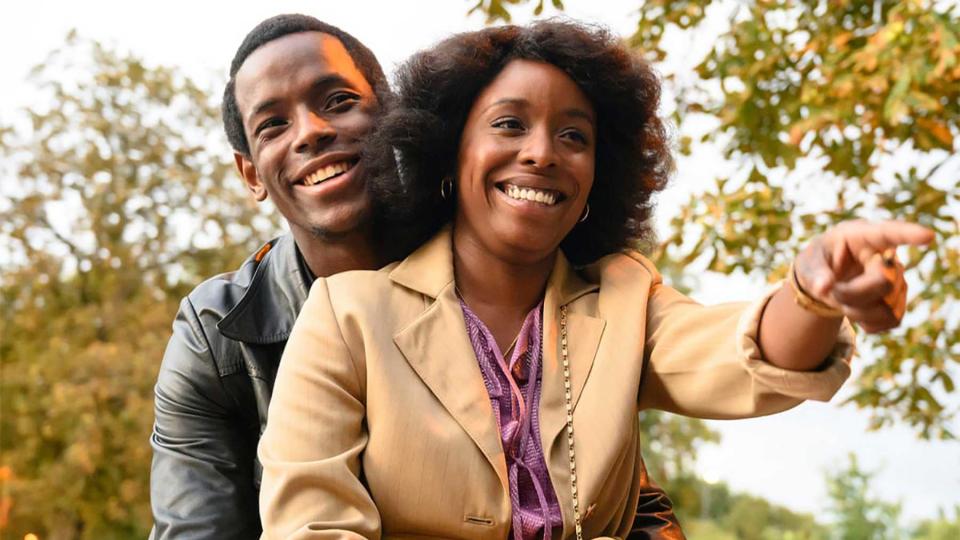
Amazon Studios
In 68 minutes, Steve McQueen has made the most intricate, joyful movie of his career, dance-party salute to Black joy and teen energy that doubles as a meditation on hidden history. In the year’s most exciting, audacious use of music onscreen, teenager Martha (Amarah-Jae St. Aubyn) and her peers hit the dance floor for a soulful rendition of Janet Kay’s 1979 single “Silly Games.” But when then the tune stops and their a cappella rendition takes over — for five mesmerizing minutes! — one woman’s high-pitch wail resolves on the same bluesy note, the feet stamping coalesces into a mighty beat, and the collective performance transforms into a dazzling, hypnotic representation of cultural solidarity. Martha’s wild night out in the Notting Hill neighborhood circa 1980 hits a few hard times, but it builds to a giddy, romantic finish that lets her get away with the excitement of discovering herself in piecemeal.
Stitched into the broader tapestry of McQueen’s five-film “Small Axe” miniseries about the experiences of West Indian Londoners across the decades, “Lovers Rock” certainly feels like a concise puzzle piece in some vast tapestry designed to make up for years of underexplored territory. At the same time, the movie — and there’s no point in questioning whether it deserves that designation — stands on its own as a poetic snapshot of life as vivid as anything in “Roma” or “Boyhood.” McQueen has told many rich, unsettling stories over the years. But with “Lovers Rock,” he funnels those same lyrical powers into a celebration of living in the moment, and we’re right there with him.
1. “First Cow”
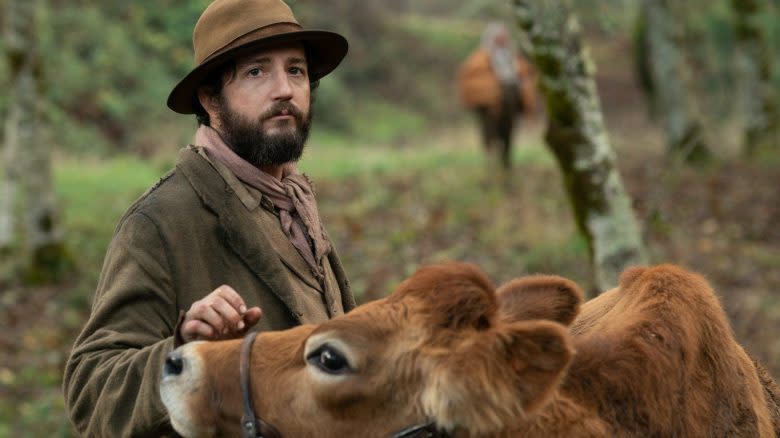
If American cinema had a poet laureate, Kelly Reichardt would hold the crown. In the 15 years since “Old Joy,” Reichardt has churned out a series of patient explorations of national identity that only get deeper with time. Reichardt’s movies work wonders out of ineffable desire, fixating with profound curiosity on ostracized loners on the margins of society eager to settle in. “First Cow” consolidates that skill into her most satisfying movie to date, a minimalist period drama about companionship, the birth of the American dream, and yes, the titular bovine. The joke of “First Cow” is that, well, who wants to watch a movie called “First Cow”? And the irony is that everyone should.
Released (barely, before shutdowns mandated that it migrate to VOD) in a year defined by the shock of a society forced to pull itself apart, “First Cow” magnifies that exact feeling. Set in the Oregon Territory circa 1820, Reichardt’s adaptation of John Raymond’s novel “The Half-Life” uses the peculiar bond of wandering chef Cookie (a tender John Magaro) and Chinese immigrant King-Lu (an overconfident Orion Lee) to explore the loneliness of an empty world and the excitement of finding some measure of companionship to chart a path forward. That’s what the pair do, by stealing milk from the only cow in the region to make cakes for settlers passing through.
It’s the subtlest heist movie in film history, but even as the men put their lives in danger for a fairly reckless plan, “First Cow” stays with the sincerity of their intentions to keep going, and the touching way that it defines their bond. The movie’s conclusive exchange lands on three encouraging words — “I’ve got you” — and they arrive like the climax of a ballad that only Reichardt could write. As with all of her work, the director communes with the notion that even reckless people simply want to find meaning in their small corners of existence. The whole world should hear her out.
Best of IndieWire
Sign up for Indiewire's Newsletter. For the latest news, follow us on Facebook, Twitter, and Instagram.


